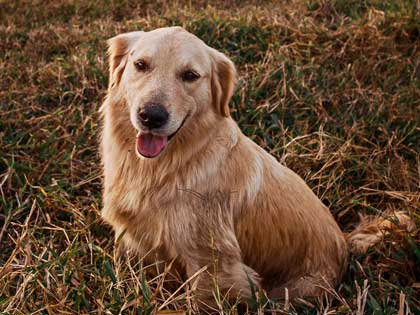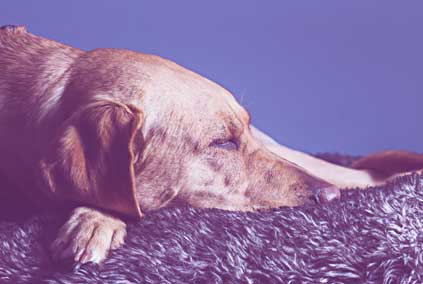Is your dog restless and panting at night? If so, you’re not alone in wondering why. Many dog owners find that their dogs exhibit this behavior at some point during their lifetime. While the cause of why there is night restlessness which can vary from dog to dog, there are a few likely explanations. In this blog post, we’ll discuss some of the most common reasons why dogs might become restless at night and offer tips on how to help them get back to sleep.
Reasons why your dog won’t settle at night
If your dog is suddenly restless at night and panting, there are a number of possible explanations. It could be that he is simply reacting to a change in his routine, such as a new baby in the house or a move to a new home.
Alternatively, he may be experiencing some form of anxiety or stress. If your dog has always been a good sleeper but is now having difficulty settling down at night, it’s important to consult with your veterinarian to rule out any underlying medical conditions. Once any health issues have been ruled out, you can begin working on strategies to help your dog relax and sleep through the night.
This may involve establishing a bedtime routine, providing comfort objects such as stuffed toys or blankets, and ensuring that he has plenty of exercise during the day. With a little patience and effort, you can help your dog get back to his usual sleeping habits.
Anxiety in dogs

One reason your dog may be restless and panting at night is that they are experiencing anxiety. Dogs can be anxious for a number of reasons, including changes in their routine, separation from their owner, or exposure to loud noises. If your dog is panting and pacing at night, try to identify any possible sources of anxiety and take steps to reduce them.
For example, if your dog is anxious about being left alone, try giving them a chew toy or bone to keep them occupied while you’re gone. You might also consider using a dog calming product like a diffuser or spray to help reduce your pet’s anxiety. If your dog’s restless behavior continues despite your efforts to reduce their anxiety, it’s important to consult with a veterinarian as they may be experiencing an underlying health condition.
Dog panting at night is a common occurrence and usually nothing to worry about. However, if your dog is panting excessively or seems to be in distress, it may be a sign of a more serious condition. Excessive panting can be a sign of heat stroke in dogs or an anxiety disorder, and it is important to seek veterinary care if your dog shows any signs of these conditions. Additionally, if your dog is drinking lots of water, it may be a sign of kidney disease or diabetes. While most causes of excessive panting are not serious, it is always best to consult with a vet to rule out any potential health concerns.
How to calm a panting dog
A dog may pant for many reasons, including heat, physical activity, pain, anxiety, or excitement. If your dog is panting and you cannot determine the cause, it is best to consult with your veterinarian.
In the meantime, there are a few things you can do to help calm your dog.
- First, try to provide a cool environment for your dog by turning on a fan or air conditioner.
- You can also offer your dog ice water to drink, but be sure to supervise closely to prevent choking. If your dog is panting due to anxiety, try to provide a sense of security by offering a favorite toy or blanket.
- You may also want to speak in a calm voice and provide gentle petting. If panting continues despite your efforts, it is best to seek medical attention.
Dog panting & anxiety at night

Dog panting is a common behavior that can have many different causes. In some cases, it may be due to anxiety or excitement. If your dog is panting heavily and seems distressed, it’s important to consult with your veterinarian to rule out other possible causes, such as heat stroke or respiratory problems.
If anxiety is the cause of your dog’s panting, there are some things you can do to help ease their distress. For example, you might try providing a calm, quiet environment and using positive reinforcement training to help them learn to associate good experiences with the things that make them anxious.
With a little patience and understanding, you can help your dog cope with their anxiety and Panting is one of the most common signs of anxiety in dogs. If your dog is panting due to anxiety, there are some things you can do to help ease their distress.
Providing a calm, quiet environment and using positive reinforcement training can help your dog learn to associate good experiences with the things that make them anxious. This is especially helpful if there are fireworks nearby or outside.
My senior dog is panting and restless at night
There are a few possible explanations for why your old senior dog may be panting at night.
- One possibility is that they are experiencing pain or discomfort from arthritis or other age-related conditions.
- Another possibility is that they are having difficulty regulating their body temperature, which is common in older dogs. If your dog is panting excessively or seems to be in distress, it is important to bring them to the vet for an examination.
- However, if they are panting moderately and don’t seem to be in any pain, there are a few things you can do to help them feel more comfortable.
Try giving them a cool place to lie down, such as a mat or blanket, and make sure they have access to fresh water. You can also try turning on a fan or air conditioner to help them stay cool. If your dog continues to pant excessively, please consult your veterinarian.